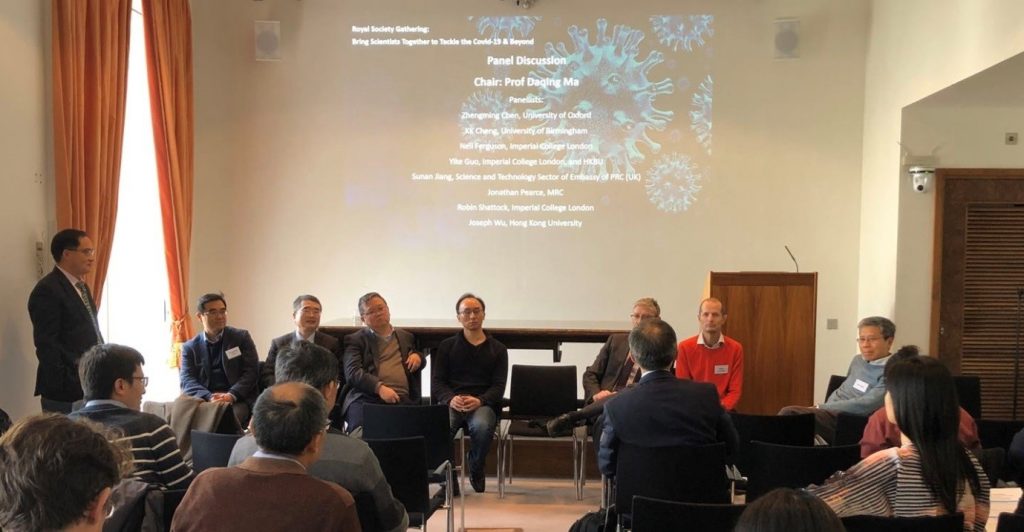17th February 2020
(By Janie Kingsley, Executive Operational Manager of ABCP)
The Valentine’s Day 2020 saw a special event in the Royal Society London where the top-notch scientists and researchers gathered along to reflect the work undertaken in their respective fields to tackle COVID-19, from medicine, epidemiology, politics, data science and public health perspectives. Jointly organized by the ABCP and Data Science Institute of Imperial College London (Imperial), this gathering attracted 15 speakers from Medical Research Council (MRC), Embassy of People’s Republic of China (PRC), and academia including Imperial, the University of Oxford (Oxford), University of Cambridge (Cambridge), University College London (UCL), the University of Hong Kong (HKU), Hong Kong Baptist University (HKBU), University of Birmingham, and so on.

Professor Neil Ferguson, from the MRC Centre for Global Infectious Disease Analysis and Imperial’s School of Public Health, started the day with the in-depth analysis upon the scale and severity of COVID-19, in Wuhan and China and looked into the estimates of Case Fatality Ratio (CFR). He concluded that “Wuhan is close to the peak of a very large epidemic of a novel coronavirus; the rest of China is perhaps a month behind”, and it is “critical that the NHS prepares, research on treatment is accelerated” as “UK policy (detecting cases in travellers, contact tracing) may buy time but is unlikely to prevent an epidemic here –which may have already started”.
Professor Joseph Wu representing the HKU COVID-19 Epidemiology and Modelling Group, shared their journey which combined epidemiological research and SEIR model, seeking the answers for the transmissibility and epidemic size in Wuhan; the volume of cases being exported to other cities in the mainland; the effectiveness of cutting off the inter-city mobility and the non-pharmaceutical interventions.
Dr Jonathan Pearce, the Associate Director of MRC reviewed the UK Vaccine Network which was co-funded in June 2015 to support the development of vaccines and vaccine technologies for diseases with epidemic potential, and the improved priority setting and coordination under the WHO Blueprint Global Coordinating (GCM) and Global Research Collaboration for Infectious Disease Preparedness (GLOPID-R). He reiterated a number of research initiatives in the wake of the COVID-19, including the £20m call out made by Department of Health and Social Care (DHSC) and UK Research and Innovation (UKRI) looking for 1) active intervention development (closed on 13 February) and 2) diagnosing and understanding COVID-19 (closing on 27 February); as well as the open-ended joint call from Wellcome Trust and Department for International Development (DFID).
Professor Robin Shattock, the Chair of Mucosal Infection and Immunity Group in Imperial shared with the audience the conventional (linear) approach to vaccine development, and the vaccine approaches to prevent COVID-19.
Professor Yi-Ke Guo, Vice-President of HKBU and the Director of Imperial’s Data Science Institute, illustrated how to build adaptive transmission model with data assimilation, and how to adjust model prediction by learning from observation.
The Minister Counsellor of Science and Technology from Chinese Embassy, Mr Sunan Jiang spoke highly of this special gathering and commented “I hope the scientists in China and UK can join hands together to fight this epidemic”.
Researchers from Liverpool School of Tropical Medicine, Wellcome Sanger Institute, University of East Anglia, Ancon Medical, UCL, Cambridge, Dongguan i4 Artificial Intelligence Laboratory (东莞工业4.0人工智能实验室), shared their research findings in the afternoon and gave more clinical and technological insight to COVID-19.
Professor Daqing Ma, one of the organisers, concluded that “China has made tremendous efforts to control the virus and we would like to put our weighting to the fight to support our motherland. The gathering was very fruitful. We are preparing a report in the next few days which hopefully will be used by Chinese officials for policy decision making to tackle the COVID-19 outbreak.”
Imperial’s Professor Daqing Ma and Professor Yike Guo, both the Vice Presidents of ABCP, initiated and organised this event and it has been warmly supported by ABCP members including Imperial’s Professor and the ABCP President Prof Jianguo Lin in its planning and execution. Dr. Caroline Li from the University of Kent has been instrumental to turn the event into reality. This gathering has been generously sponsored by the company Behemon Co. Ltd (杭州巨兽网络科技有限公司) in Hangzhou, China and the Data Science Institute at the Imperial College London.
